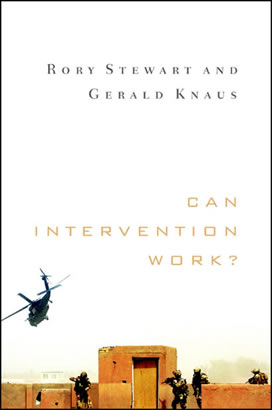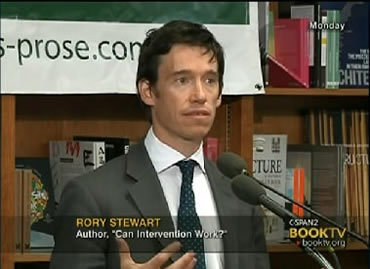 "Can Intervention work?" is the new book by ESI founding chairman Gerald Knaus and British member of parliament Rory Stewart.
"Can Intervention work?" is the new book by ESI founding chairman Gerald Knaus and British member of parliament Rory Stewart.
The book discusses issues that remain at the heart of the global political agenda. These issues have also been central to the work of ESI since 1999: the legitimacy and dangers of interventions; the limits of international power and knowledge in state building missions; the temptation of liberal imperialism; the impact of international war crimes tribunals; how to get others to "want what you want" in building institutions; what outsiders can and cannot do.
The book has come out in the US in August 2011 as part of the Amnesty International Global Ethics Series, on the occasion of the 50th anniversary of one of the world's leading human rights organisations. It will come out in Europe in September 2011.
"Can we intervene in foreign countries and do good? Can we stop wars and genocides and get rid of evil dictators? Can we then build modern, democratic states that thrive in our wake? ... Rory Stewart and Gerald Knaus are well placed to pose and answer these questions ... From rather successful interventions, defined as Bosnia and Kosovo, the authors convey an important lesson: that is, the experience garnered in one place is generally not much use elsewhere."
"I devoured this brilliant Burkean tract at a sitting. Is it too much to hope that it will be read not just in Downing Street and the Foreign Office, but also the State Department and the White House?"
"In "Can Intervention Work?" Rory Stewart and Gerald Knaus provide a fresh and critically important perspective on foreign interventions."
"Timely lessons in when to intervene"
"A fine new book"
"Stewart, a British member of parliament famous for his walk across Afghanistan after the U.S. invasion, and Knaus, the chairman of the European Stability Initiative, take a bulldozer to the theoretical underpinnings of humanitarian intervention–the idea that the international community can save lives and transform societies if only it applies the proper resources and plans."
"Two experienced authors effectively identify what those who decide to make such interventions require for success, that what is required often does not exist and that brute force is not a viable alternative."
"We can give a clear and reassuring answer to the question this book asks: Can intervention work? Yes, it can, because it did. The killing fields of Bosnia were transformed in the course of one decade in an unexpected and surprising manner. It was within the gift of outsiders not only to bring this war to a temporary end, but also to then build a peace that has since lasted for more than fifteen years. One lesson we learned in the early 1990s is that there is a high price, in human, moral, and strategic terms, of not attempting to intervene when this seems possible and within our power in the face of mass atrocities. People are still haunted by the ghosts of Rwanda and Srebrenica."
(From Can Intervention Work)
|
On "failure is not an option"
|

Politics and Prose in DC – Rory Steward: Can intervention work? (15 August 2011)
|
Can Intervention Work? © ESI. All rights reserved.
|
Can Intervention Work – in the media
- ORF, Tanja Malle, "Humanitäre Intervention oder unrechtmäßige Einmischung? Über den Sinn und Unsinn von internationalen Militäreinsätzen" ("Humanitarian or unlawful intervention? Sense and nonsense in international military interventions") (13 June 2012)
- Arab News, Neil Berry, "Interventionists for whom sorry seems to be the hardest word" (30 March 2012)
- The Oxonian Review, Nakhul Krishna, "Mountain Rescue" (12 March 2012)
- Neue Zürcher Zeitung, Ulrich Speck, "Weniger ist mehr" ("Less is more") (1 March 2012)
- Le Devoir, Jean-Frédéric Légaré-Tremblay, "Entrevue avec Rory Stewart - Leçons de réalisme" ("Meeting Rory Stewart - Lessons in realism") (24 December 2011)
- Jeta në Kosovë, Besa Shahini, "Suksesi i Intervenimeve Ndërkombëtare" ("The success of international interventions") (30 November 2011)
- The New York Times, Alexander Star, "Afghanistan: What the Anthropologists Say" (18 November 2011)
- The Sunday Times, Dominic Lawson, "When their business is our business" (6 November 2011)
- Veja, Nana Queiroz, "Otan se retira a tempo, para não 'reviver o Iraque' na Líbia" ("NATO to withdraw this time, no 'repetition of Iraq' in Libya") (1 November 2011)
- Trouw, Eric Brassem, "Steun voor de een, bommen voor de ander" ("Support one, bomb others") (24 October 2011)
- Profil, Martin Staudinger and Robert Treichler, "Der perfekte Krieg" ("A perfect war") (22 October 2011)
- The Economist, "When to hold and when to fold" (22 October 2011)
- The Telegraph, Peter Oborne, "Can Intervention Work? by Rory Stewart and Gerald Knaus: review" (10 October 2011)
- The Guardian, Rory Stewart, "What can Afghanistan and Bosnia teach us about Libya?" (8 October 2011)
- Hindustan Times, Dipankar der Sarkar, "Good news from Afghanistan" (3 October 2011)
- Macleans.ca, "REVIEW: Can Intervention Work?" (29 September 2011)
- The Wallstreet Journal, Ian Marcus Corbin, "When Things Don't Get Better" (23 September 2011)
- Reuters, Rory Stewart, "My uphill battle against the Afghanistan intervention" (21 September 2011)
- Transitions Online, Adam Cardais, "Bosnia: A Model Intervention?" (15 September 2011)
- The Atlantic, Anne-Marie Slaughter, "Intervention, Libya, and the Future of Sovereignty" (4 September 2011)
- The Washington Post, Seth G. Jones, "'Can Intervention Work?' by Rory Stewart and Gerald Knaus" (2 September 2011)
- Council on Foreign Relations, Isobel Coleman, "Missing Pieces: Humanitarian Intervention, Egypt's Economy, and More" (2 September 2011)
- The Daily Beast, Ian Klaus, "Imperial Locavores" (29 August 2011)
- Financial Times, Gideon Rachman, "Timely lessons in when to intervene" (28 August 2011)
- The New York Times, Clay Risen, "Obama's Non-Doctrine Doctrine" (26 August 2011)
- The New Republic, Gerald Knaus, "Yes, Nation-Building Can Work! And There's a Model Out There for Libya" (25 August 2011)
- Amazon.com, Peter Hillman, "Timely, balanced, insightful and always engaging" (24 August 2011)
- CNN World, "Can Intervention Work?" - excerpt - (23 August 2011)
- The Washington Post, Jason Ukman, "The lesson of Libya: Limited intervention can work" - interview with Gerald Knaus - (22 August 2011)
- Slate, Fred Kaplan, "It's Not What We Ought To Do, But What We Can Do" (19 August 2011)
- Charlie Rose with Rory Stewart, "Can Intervention Work?" (18 August 2011)
- WNYC (New York Public Radio), The Leonard Lopate Show, "Can Intervention Work?" (16 August 2011)
- Politics and Prose in DC – Rory Stewart: Can intervention work? (15 August 2011)
Acknowledgements from Gerald Knaus
"Many of the ideas in this book emerged from joint work with my colleagues at the European Stability Initiative (ESI), the best team I ever came across when it comes to developing new ideas. I want to thank all of them for their inspiration; in particular Piotr Zalewski for his help as editor; Kristof Bender and Minna Jarvenpaa for detailed feedback to many drafts; and Marcus Cox, Kristof Gosztonyi, Eggert Hardten, Verena Knaus, Felix Martin, Alex Stiglmayer and Besa Shahini for many intense debates on all the issues discussed here.
The actual writing took place during my time with the Harvard Kennedy School, first as a visiting and then as an associate fellow at the Carr Center on Human Rights Policy. I am grateful to the school, the center, colleagues, other fellows and all of our impressive students. It was a privilege to work alongside all of them. Special thanks to Charlie Clements, and of course to Rory, for persuading me to come to the US, agreeing to take up the challenge of a joint book and then finding time to work long nights – in Istanbul, Scotland, Cumbria and London – despite the demands of a political career. I am also grateful for the enormous patience and encouragement of everyone at Norton, Jake Schindel, Brendan Curry and Roby Harrington."

